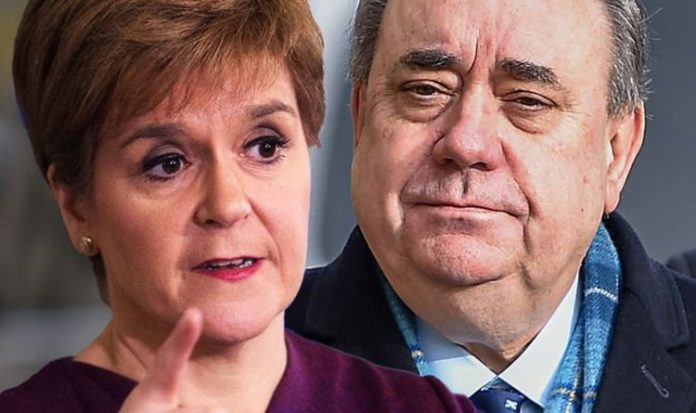Nicola Sturgeon is facing a factional dispute within the SNP as her predecessor Alex Salmond makes startling claims. The former First Minister has hit out at the current Scottish Government over its handling of harassment complaints made against him, with Mr Salmond accusing Ms Sturgeon’s allies of trying to “banish him” from public life. Mr Salmond was acquitted of 13 charges of sexual assault last march, and also took the Scottish Government to court over its handling of the complaints, winning a judicial review. Two inquiries were then undertaken, looking into the handling of complaints by both the SNP Government and Ms Sturgeon herself.
Ms Sturgeon is under scrutiny because she told Scottish Parliament that she first learned of allegations against Mr Salmond on April 2, 2018, but then said in a written statement that she had discussed a meeting with Mr Salmond that might involve “allegations of a sexual nature” days earlier on March 29.
James Mitchell, professor of public policy at Edinburgh University has warned that this is “very serious” for the SNP as the controversy comes just as support for independence grows and with Scottish elections around the corner.
He told the New York Times: “This has happened at the point where the SNP is set to have good election results and when support for independence is at its highest.
“In those circumstances you would expect the party would unite, whereas in fact it has not been so disunited in decades.”
Tension has reportedly existed between Ms Sturgeon and Mr Salmond for years, including over the former Scottish First Minister’s decision to host a show on Russia Today.
Professor Mitchell continued: “He couldn’t let go, and she wouldn’t find him a role.
“She is a control freak in the way that she conducts the party, in the same way that he was. They are too similar; there was always going to be a problem.
“Things are beginning to shift in Scotland.
“[Mr. Salmond] was the villain of the piece, but now people are asking questions.”
READ MORE: Sturgeon humiliated as independent Scotland will be ‘much poorer’
“There are a couple of precedents that could support that – in 1973 there was a border poll in Northern Ireland on reunification.
“That was boycotted by unionists in Northern Ireland, and there is also the Catalonian referendum in 2017 which was boycotted by pro-Spanish voters.
“How significant that becomes is a question of how high support for independence is. If it is floating at just around 50 percent then a unionist boycott is a significant undermining of its legitimacy.
“If however, support for independence is as high as 75 percent, then a boycott would be much less significant.”







